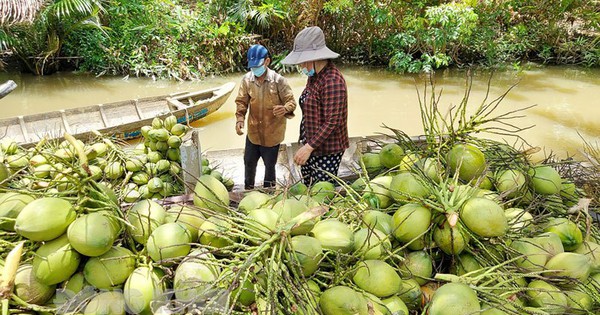 Society
Society
.jpg)
 |
| Coconuts are being harvested and classified in Bến Tre Province. — Photo baochinhphu.vn |
BẾN TRE — After four years of implementing Resolution No. 07-NQ/TW issued on January 29, 2021, by the Bến Tre Provincial Party Committee, the province’s agricultural sector has made significant strides towards building concentrated production zones and developing value chains for key agricultural products.
The resolution, focusing on the period 2020-2025 with a vision to 2030, aims to restructure local agriculture towards higher quality, productivity, and competitiveness.
So far, Bến Tre has established linked production areas that supply a stable raw material base for the processing and export industries.
Recognising agriculture as the economic backbone, the province has aggressively promoted restructuring efforts, deep-processing strategies, and added value in agricultural output.
Farmers are increasingly aware of the benefits of cooperative economics and participating in value chains, leading to the formation of large raw material zones and initial producer-consumer linkages.
Nguyễn Chí Thanh, a coconut grower in Phong Nẫm Commune, Giồng Trôm District, said his family’s nearly two hectares of coconut trees yield about 2,000 coconuts per harvest.
In the past, they relied on traders, facing unstable prices and frequent undercutting.
However, since signing a contract with Lương Quới Coconut Processing Company through a local cooperative, he now enjoys 15 per cent higher prices than the market rate, with an additional VNĐ20,000 (US$0.8) per dozen if the market price falls below VNĐ50,000 (US$2).
The company also supports farmers in organic farming methods, reducing fertiliser and pesticide costs, and increasing profits compared to traditional methods.
According to the provincial Department of Agriculture and Environment, Bến Tre currently has 94 cooperative groups, 85 cooperatives, and four linkage teams involved in key product value chains.
These include coconuts, ornamental plants, fruit trees, and seedlings, with production increasingly shifting towards concentrated, organic, and linked models.
Specifically, the coconut value chain has 36 cooperative groups and 36 cooperatives involved in a total area of over 21,463 hectares and 19,045 members.
The rambutan chain includes 22 cooperative groups and three cooperatives covering 232 hectares, with an annual output of about 800 tonnes.
The green-skinned pomelo chain includes 21 cooperatives, eight cooperative groups, and four linkage teams across 706 hectares, yielding around 8,000 tonnes a year.
Huỳnh Quang Đức, Deputy Director of the Department of Agriculture and Environment, said that the implementation of Resolution 07 was timely and well-aligned with global agricultural trends.
The resolution supports the dual goals of building certified raw material zones and producing goods that meet international standards, such as organic certifications from South Korea, China, Japan, and the US.
Among all the value chains, coconut stands out for its scale, quality, and clear added value.
The province now has three domestic coconut farming areas covering nearly 120 hectares, along with 133 designated export growing zones (with official codes) totalling over 8,391 hectares.
Annually, coconut exports contribute nearly US$500 million to the province’s economy.
Fruit chains are also yielding positive results, enabling Bến Tre to begin exporting specialty fruits.
Other value chains, however, are still limited due to a lack of leading enterprises, focusing only on raw material supply without deep processing or export.
Đức acknowledged that while some supply chains have emerged, they remain fragmented and lack sustainability—except for coconut.
Public awareness of the role of modern cooperatives remains limited, and many cooperatives still lack strong partnerships with businesses and members.
Building concentrated farming zones
Provincial authorities are continuing efforts to expand concentrated production zones aligned with local planning and strategic orientations.
The Department of Agriculture and Environment is working with localities to develop seven key plans for coconut, pomelo, other fruits, rice, seedlings, ornamental plants, cattle, pigs, and shrimp.
These include pilot models, support for traceability, and geographical indications to ensure food safety and export standards.
To date, the province has built 25,000 hectares of organic coconut farming zones, 1,630 hectares of specialty fruits, 420 hectares of seedlings and ornamental plants, and 4,000 hectares of high-tech shrimp farming.
Pilot programmes of concentrated coconut farming zones now cover 2,202 hectares, with participating businesses purchasing directly from these zones.
The agriculture sector is also supporting technical training, organic fertiliser use, and rearing beneficial insects (such as parasitoid wasps and rove beetles) to promote sustainable models.
The province is preparing documentation to qualify coconut growing areas for official export to China.
Between 2024 and 2025, Bến Tre aims to maintain a stable coconut cultivation area of about 79,000 hectares.
Local enterprises are also actively investing in raw material zones to secure input for their processing activities.
Trần Văn Đức, Chairman and CEO of Bến Tre Coconut Investment Joint Stock Company (Beinco), noted that the recent rise in coconut prices has disrupted supply for factories, especially those that are deeply integrated into global supply chains.
He called for combining local resources with advanced processing technologies to boost added value and export turnover.
In the time ahead, the province will continue to raise public awareness about the importance of Resolution 07-NQ/TW and integrate it into local plans and programmes.
Successful models will be scaled up, with a focus on strengthening value chains, enhancing benefits for all stakeholders, and enhancing the position of Bến Tre’s agricultural products in domestic and international markets. — VNS